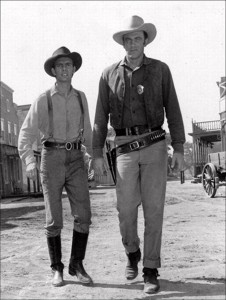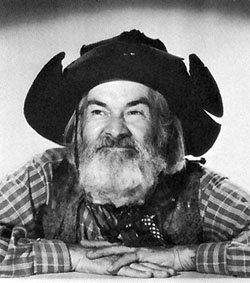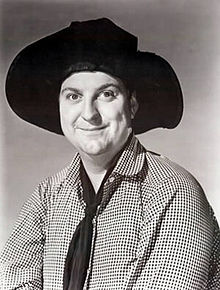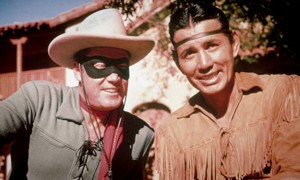In Westerns, nearly every handsome hero needs a cantankerous old man as his companion (like Gabby Hayes). If not that, then a fat, silly one (like Smiley Burneette, or a dopey, well-meaning nic one (like Tonto);or one who limps (like Chester), or at least one who is always getting into a mess that the hero gets him out of (like Andy Devine).
 Sidekicks might be annoying and troublesome to just about everyone in town, but the man they hang around knows they are goof at heart. Very often they are pariahs whom no one else will be friends with because they used to have a drinking problem, because they don’t shave and smell bad, because they’re moochers, or simply because they’re different. But a real cowboy hero has a noble perspective on human nature and sees beyond all such superficial shortcomings to become a true friend to his inferior’s companion. Besides, on those rare occasions when a cowboy hero is in trouble, it is often or straight shooting (which are too assertive for a sidekick), but stealthily, perhaps by masquerading as a mule or hiding in a keg or rum, or by otherwise taking advantage of his hopelessly second-rate stature to sneak past the bad guys and help his friends.
Sidekicks might be annoying and troublesome to just about everyone in town, but the man they hang around knows they are goof at heart. Very often they are pariahs whom no one else will be friends with because they used to have a drinking problem, because they don’t shave and smell bad, because they’re moochers, or simply because they’re different. But a real cowboy hero has a noble perspective on human nature and sees beyond all such superficial shortcomings to become a true friend to his inferior’s companion. Besides, on those rare occasions when a cowboy hero is in trouble, it is often or straight shooting (which are too assertive for a sidekick), but stealthily, perhaps by masquerading as a mule or hiding in a keg or rum, or by otherwise taking advantage of his hopelessly second-rate stature to sneak past the bad guys and help his friends.
The kind of sidekicks was George Hayes, who had made a fortune as an actor playing all sorts of roles on stage and in movies in the 1920s, after which he retires. However, he lost his money in the stock market crash of 1929, so he was forced to return to the screen to earn a living. At first Hayes played bad guys in cowboy movies, but in 1036 he hit his stride as “Windy Halliday,” hopalong Cassidy’s colorful, irritable sidekick, who he played until 1939, when Roy Roger’s  sidekick, Gabby, a role he also played alongside leading man Bill Elliott. The definitive sidekick, Gabby Hayes- who in real life was a well-read, cultured man of the world- was an ornery, mush-mouthed, toothless cuss who frequently expressed his convictions by appending statements with the phrase, “Yer dern tootin’!” The majority of sidekicks were bewhiskered coots of the Gabby Hayes school, foremost among them Andy Clyde, who played California Carlson, Hoppys’s pal, in the 1940s; Al “Fuzzy” St. Johns who played Fuzzy Q. Jones alongside nearly every big cowboy stat in the 1940s; and Walter Brennnan, who played John Wayne’s companion in Red River (1948), a crabby, toothless, lame prospector (in the company of Jimmy Stewart) in the Far Country (1955), and a crabby, toothless, lame sheriff’s helper (in the company of John Wayne) in Rio Bravo (1959). In all three films, Brennan made a fetish of how he brewed his coffee.
sidekick, Gabby, a role he also played alongside leading man Bill Elliott. The definitive sidekick, Gabby Hayes- who in real life was a well-read, cultured man of the world- was an ornery, mush-mouthed, toothless cuss who frequently expressed his convictions by appending statements with the phrase, “Yer dern tootin’!” The majority of sidekicks were bewhiskered coots of the Gabby Hayes school, foremost among them Andy Clyde, who played California Carlson, Hoppys’s pal, in the 1940s; Al “Fuzzy” St. Johns who played Fuzzy Q. Jones alongside nearly every big cowboy stat in the 1940s; and Walter Brennnan, who played John Wayne’s companion in Red River (1948), a crabby, toothless, lame prospector (in the company of Jimmy Stewart) in the Far Country (1955), and a crabby, toothless, lame sheriff’s helper (in the company of John Wayne) in Rio Bravo (1959). In all three films, Brennan made a fetish of how he brewed his coffee.
The other basic types of sidekicks include:
Men Of Girth
The two best-known portly sidekicks were Smiley Burnette, who rode alongside Gene Autry in  eighty-one films (and then played railroad engineer Charley Pratt in TV’s “Petticoat Junction”) and Andy Devine, who appeared as the always-hungry stage driver in Stagecoach (1939) and whose signature like is Jingles B. Jones in TV’s “Wild Bill Hickok” (1951-58) was “Wait for me, Wild Bill!” One of the oddest fat sidekicks was Oliver Hardy in a raccoon-skin cap- John Wayne’s comrade in the fighting Kentuckian (1949).
eighty-one films (and then played railroad engineer Charley Pratt in TV’s “Petticoat Junction”) and Andy Devine, who appeared as the always-hungry stage driver in Stagecoach (1939) and whose signature like is Jingles B. Jones in TV’s “Wild Bill Hickok” (1951-58) was “Wait for me, Wild Bill!” One of the oddest fat sidekicks was Oliver Hardy in a raccoon-skin cap- John Wayne’s comrade in the fighting Kentuckian (1949).
Men of Color
The wisest of all sifekicks was the Lone Ranger’s Tonto (Jay Silverheels, a Canadian Mohawk Indian born “Harold J. Smith”), who was motion pictures’ foremost speaker of “injun dialect”- a language limited to nouns, adjectives, and simple verbs accompanied by expressive grunts, but devoid of  articles, prepositions, and all nominative pronouns, ie.: “Ummmm… Him big chief all Comanche’s,” One of the most memorable ethnic partners was Leo Carillo, who played the Cisco Kids merry skirt-chasing amigo, Poncho; of him, Duncan Renaldo (who played the Kid) said, “His accent was so exaggerated that when we finished a picture, no one in the cast or crew could talk normal English anymore.” A few notable non-Caucasian sidekicks were Robert Blake as Little Beaver, the juvenile Native American chum of Bill Elliott (as Red Ryder) in the 1940s; woody Strode as Pompey, John Wayne’s African American confidant in The Man Who Shot Liberty Valance(1962); and X brands as Pahoo Ka-Ta-Wah (Pawnee for “wolf who stands in water”), the stealthy companion of TV’s Yancy Derringer (1958-59). Pahoo carried a double barreled shot gun and was always ready to slip Mr. Derringer a Bowie knife in emergencies; Pahoo was also apparently a mute.
articles, prepositions, and all nominative pronouns, ie.: “Ummmm… Him big chief all Comanche’s,” One of the most memorable ethnic partners was Leo Carillo, who played the Cisco Kids merry skirt-chasing amigo, Poncho; of him, Duncan Renaldo (who played the Kid) said, “His accent was so exaggerated that when we finished a picture, no one in the cast or crew could talk normal English anymore.” A few notable non-Caucasian sidekicks were Robert Blake as Little Beaver, the juvenile Native American chum of Bill Elliott (as Red Ryder) in the 1940s; woody Strode as Pompey, John Wayne’s African American confidant in The Man Who Shot Liberty Valance(1962); and X brands as Pahoo Ka-Ta-Wah (Pawnee for “wolf who stands in water”), the stealthy companion of TV’s Yancy Derringer (1958-59). Pahoo carried a double barreled shot gun and was always ready to slip Mr. Derringer a Bowie knife in emergencies; Pahoo was also apparently a mute.
The Physically Challenges
Handicapped sidekicks (not counting minor afflictions like lack of teeth)include John “Fuzzy” Knight, whose stutter and hyperthyroid eyeballs made in a comic foil for many leading men from the 1930s into the 1050s; Gene Sheldon as Bernardo, Zorro’s mute manservant (and the only person other than Zorro’s father who knew his real identity) in the TV series of 1957-59; and Dennis Weaver, whose game leg in “Gunsmoke” seemed to be at least part of the source of his irascible nature as Matt Dillon’s deputy, Chester B. Goode.